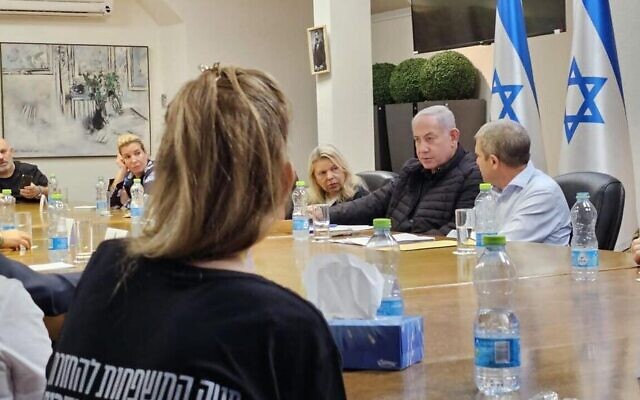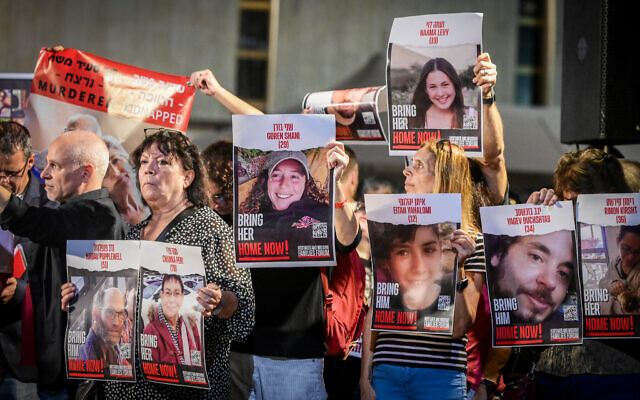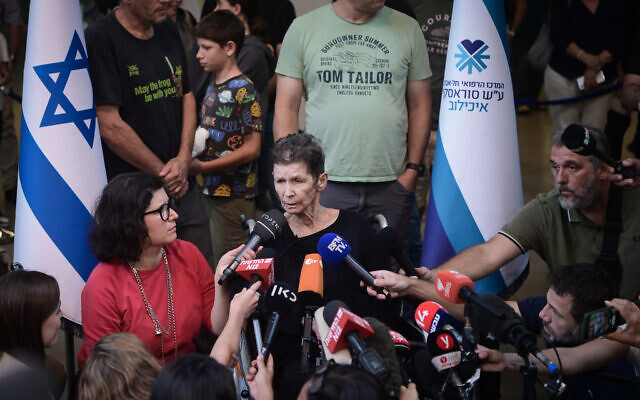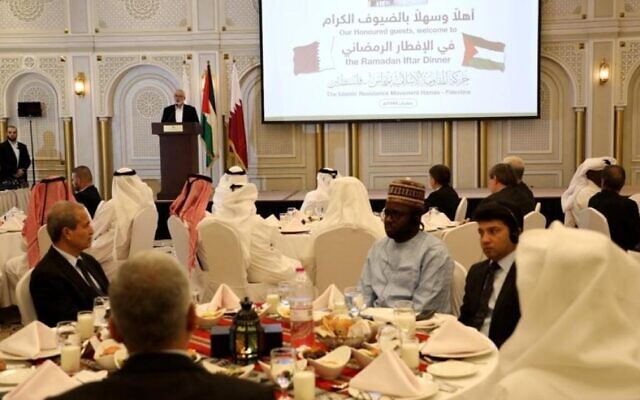The spokesperson for Qatar’s foreign ministry said Saturday that Israel’s intensified offensive in Gaza launched on Friday has significantly complicated Doha’s efforts to secure the release of the hostages taken from Israel during Hamas’s sock terror onslaught on October 7.
“This escalation makes it considerably more difficult,” Majed al-Ansari told CNN Saturday while noting that both Prime Minister Benjamin Netanyahu and Hamas’s Gaza terror chief Yahya Sinwar have continued to express openness toward the issue.
Sinwar said earlier that his terror group was ready to “immediately” swap with Israel in a deal “that includes “releasing all prisoners in the prisons of the Zionist occupation enemy in return for the release of all prisoners held by the resistance,” in a comment posted Saturday evening on Hamas media groups.
Netanyahu said the government was discussing the issue after being asked about the proposal while saying that discussing the details publicly would harm efforts to reach a deal.
The prime minister also insisted that “broadening the ground offensive does not clash in any way with our ability to bring back the hostages.”
On Friday night and into Saturday, the Israeli military continued its ground operations into the Gaza Strip targeting several Hamas operatives and positions, according to the Israel Defense Forces, hitting more than 150 underground tunnels and bunkers.

Qatar’s foreign ministry spokesperson Majed al-Ansari addresses the Doha forum on December 6, 2018. (Screen capture/YouTube)
The IDF warned residents of Gaza City that the area was now a “battlefield,” as it stepped up its air campaign against Hamas terrorists in the Palestinian territory.
Israel has repeatedly warned that it is heavily targeting Gaza City and other areas in northern Gaza, where Hamas is believed to have its main bases of operations and has extensive underground installations, many of them located under the city. The military has been urging some one million civilians to move to the Strip’s south for two weeks. Many have done so, but hundreds of thousands are thought to remain.
Israel has been fighting Hamas since October 7, when some 2,500 terrorists streamed into Israel by land, sea and air, killing over 1,400 people, a majority of them civilians in their homes and at an outdoor music festival. Hamas and allied terrorist factions also dragged some 230 hostages — including some 30 children — into the Gaza Strip where they remain captive.
At a press conference Saturday night, Netanyahu said his heart was broken after meeting the families of the hostages, and pledged, “We will utilize every opportunity to return our kidnapped brothers and sisters to their families’ embrace.”
“Their abduction is a crime against humanity,” he said.
The family representatives had urged Netanyahu to agree to an “everyone for everyone” prisoner exchange with Hamas.

Prime Minister Benjamin Netanyahu meets with representatives of families whose loved ones are being held hostage by Hamas in the Gaza Strip, October 28, 2023. (GPO)
Sinwar said earlier that his terror group was ready to “immediately” swap with Israel in a deal “that includes releasing all prisoners in the prisons of the Zionist occupation enemy in return for the release of all prisoners held by the resistance,” in a comment posted Saturday evening on Hamas media groups.
Qatar has so far played a key role in the release of four hostages since the October 7 terror massacre, including an American-Israeli mother and daughter, and two elderly Israeli women.
Qatar hosts both a US military base and Hamas’s political bureau which doubles as the main residence of its self-exiled leader Ismail Haniyeh, as well as its former leader Khaled Mashaal. The country is one of Hamas’s main backers, transferring hundreds of millions of dollars to the terror group annually.
Speaking to CNN on Saturday, al-Ansari said that “moving people [hostages] during a [ground] incursion and [under] increased bombardment” is more difficult. “But also from a political [perspective], mediation only works when you have periods of calm.”
He stresses that the talks were “ongoing” and that “nobody in the region can afford to give up on this and just leave it to the military people to decide what happens in the future.”
Qatar was credited for brokering the release of two pairs of female hostages on October 20 and October 22, but al-Ansari indicated that successive hostage releases might require Israel to release prisoners of its own.
“We are talking around the idea of more hostages coming out, we’re talking about the idea of a prisoner exchange,” al-Ansari said.

Families of Israelis held hostage by Hamas terrorists in Gaza hold a press conference outside the Art Museum of Tel Aviv, October 28, 2023. (Avshalom Sassoni/Flash90)
“We are optimistic that the dots are heading more toward all civilian hostages, but obviously it’s a fluid situation on the ground,” he adds.
The Qatari government spokesperson acknowledged that Doha does not have a definitive number of how many hostages are currently being held in Gaza. “I’m not sure, to be honest, that anybody knows,” he said adding that the lists provided by Israel and Hamas “are not necessarily always the same,” while appearing to confirm Palestinian Islamic Jihad claims that it too is holding a number of hostages.
The military has notified the families of 230 hostages that their loved ones are currently being held in the Gaza Strip. The number is not final as the military investigates new information.
Al-Ansari claimed that both Israel and Hamas “acknowledge that the civilian hostages need to [be released] immediately,” though he did not say why Hamas continues to hold them in Gaza.
He said Qatar prioritizes women and children followed by “foreign citizens” in the negotiations, without clarifying whether he’s referring to dual nationals or those without an Israeli passport. However, he insisted that the latest discussions pertain to all civilians being held in Gaza, regardless of their age, gender, or nationality.
Al-Ansari did not mention the subgroup of soldiers who are also among those being held hostage. Hamas officials said toward the beginning of the war that it would only start negotiating their release after the fighting ended, but Sinwar said Saturday that the terror group would be prepared to release them all “immediately.”
Israel believes that Hamas has been dragging out the hostage negotiations as a tactic to delay a ground offensive by the Israeli military, and has dismissed the “rumors” of any progress on talks.

Freed Israeli hostage Yocheved Lifshitz speaks to press at Ichilov hospital in Tel Aviv on October 24, 2023 (Photo by Avshalom Sassoni/Flash90)
Military spokesperson Rear Adm. Daniel Hagari dismissed the “psychological terror” by Hamas and said Israel was working on multiple channels to free the hostages.
Qatar’s role in the current conflict has been a source of controversy in Israel, with a growing number of officials arguing that Doha should not be hosting the terror group after the carnage that Hamas inflicted on October 7.
At the same time, there appears to be recognition in Jerusalem that Qatar is the country most capable of mediating between Israel and Hamas, perhaps because of Doha’s longstanding ties to the terror group.
National Security Council chairman Tzachi Hanegbi even hailed Qatar’s efforts in an English tweet earlier this week that drew criticism from former prime minister Naftali Bennett but also led many analysts to believe that a major deal to release the hostages in Gaza was on the horizon.
In his CNN interview, Al-Ansari said contacts with Hamas were “useful,” arguing that the channel of communication has been critical for talks on the release of the hostages and for efforts to de-escalate fighting between the terror group and Israel.
He said “various sides” had pushed Qatar to open a line of communication with Hamas and to even allow the terror group to establish a political bureau in Doha. “This channel has been very instrumental in countering the escalations that took place,” he said, claiming that Qatar’s talks with Hamas helped curb tensions in September after two weeks of border rioting by Palestinians.
“Therefore, as long as this channel is useful in creating peace, we have to have it. We cannot afford to lose it,” al-Ansari said.

Hamas leader Ismail Haniyeh delivering a speech during an Iftar dinner in Qatar with Qatari officials and international diplomats, April 13, 2023 (Hamas.ps)
“It is now useful during this escalation. It is the only way that we are mediating the release of these hostages and for them to get back home to their families,” he added.
The Washington Post reported on Thursday that the US and Qatar agreed to reevaluate the Gulf monarchy’s relationship with Hamas after Doha completes its role in freeing the hostages.
It is yet to be decided if the review will include the potential deportation of Hamas’s leaders living in Qatar or other similar measures directed at the terror group’s political bureau, according to the report, which cited four diplomats with knowledge of the discussions.
This post was originally published on this site be sure to check out more of their content.






